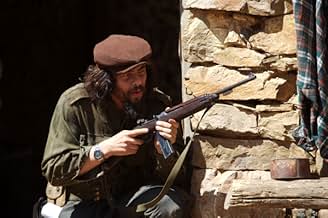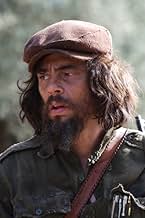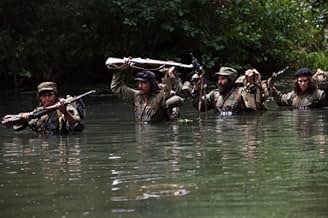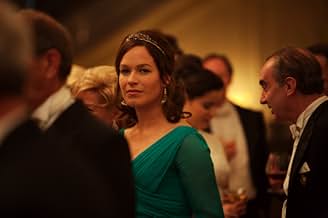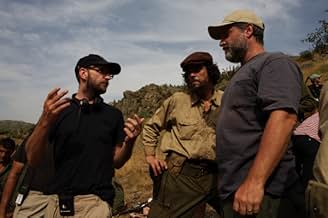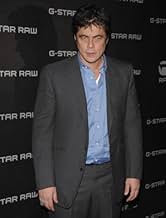IMDb RATING
6.8/10
36K
YOUR RATING
In 1967, Ernesto 'Che' Guevara leads a small partisan army to fight an ill-fated revolutionary guerrilla war in Bolivia, South America.In 1967, Ernesto 'Che' Guevara leads a small partisan army to fight an ill-fated revolutionary guerrilla war in Bolivia, South America.In 1967, Ernesto 'Che' Guevara leads a small partisan army to fight an ill-fated revolutionary guerrilla war in Bolivia, South America.
- Director
- Writers
- Stars
- Awards
- 2 wins & 7 nominations total
Demián Bichir
- Fidel Castro
- (as Demian Bichir)
- Director
- Writers
- All cast & crew
- Production, box office & more at IMDbPro
Featured reviews
Ironically the most talked-about American film in the 2008 New York Film Festival is 98% in Spanish. The extra-long film's controversy began at the Cannes Festival. There were love-hate notices, and considerable doubts about commercial prospects. As consolation the star, Benicio Del Toro, got the Best Actor award there. I'm talking about Steven Soderbergh's 'Che,' of course. That's the name it's going by in this version, shown in New York as at Cannes in two 2-hour-plus segments without opening title or end credits. 'Che' is certainly appropriate since Ernesto "Che" Guevara is in almost every scene. Del Toro is impressive, hanging in reliably through thick and thin, from days of glorious victory in part one to months of humiliating defeat in part two, appealing and simpatico in all his varied manifestations, even disguised as a bald graying man to sneak into Bolivia. It's a terrific performance; one wishes it had a better setting.
If you are patient enough to sit through the over four hours, with an intermission between the two sections, there are rewards. There's an authentic feel throughout--fortunately Soderbergh made the decision to film in Spanish (though some of the actors, oddly enough in the English segments especially, are wooden). You get a good outline of what guerrilla warfare, Che style, was like: the teaching, the recruitment of campesinos, the morality, the discipline, the hardship, and the fighting--as well as Che's gradual morphing from company doctor to full-fledged military leader. Use of a new 9-pound 35 mm-quality RED "digital high performance cine camera" that just became available in time for filming enabled DP Peter Andrews and his crew to produce images that are a bit cold, but at times still sing, and are always sharp and smooth.
The film is in two parts--Soderbergh is calling them two "films," and the plan is to release them commercially as such. First is 'The Argentine,' depicting Che's leadership in jungle and town fighting that led up to the fall of Havana in the late 50's, and the second is 'Guerrilla,' and concerns Che's failed effort nearly a decade later in Bolivia to spearhead a revolution, a fruitful mission that led to Guevara's capture and execution in 1967. The second part was to have been the original film and was written first and, I think, shot first. Producer Laura Bickford says that part two is more of a thriller, while part one is more of an action film with big battle scenes. Yes, but both parts have a lot in common--too much--since both spend a large part of their time following the guerrillas through rough country. Guerrilla an unmitigated downer since the Bolivian revolt was doomed from the start. The group of Cubans who tried to lead it didn't get a friendly reception from the Bolivian campesinos, who suspected foreigners, and thought of the Cuban communists as godless rapists. There is a third part, a kind of celebratory black and white interval made up of Che's speech at the United Nations in 1964 and interviews with him at that time, but that is inter-cut in the first segment. The first part also has Fidel and is considerably more upbeat, leading as it does to the victory in Santa Clara in 1959 that led to the fall of the dictatorship of Fulgencio Batista in Cuba.
During 'Guerilla' I kept thinking how this could indeed work as a quality European-style miniseries, which might begin with a shortened version of Walter Salles's 'Motorcycle Diaries' and go on to take us to Guevara's fateful meeting with Fidel in Mexico and enlistment in the 26th of July Movement. There could be much more about his extensive travels and diplomatic missions. This is far from a complete picture of the man, his childhood interest in chess, his lifelong interest in poetry, the books he wrote; even his international fame is only touched on. And what about his harsh, cruel side? Really what Soderbergh is most interested in isn't Che, but revolution, and guerrilla warfare. The lasting impression that the 4+ hours leave is of slogging through woods and jungle with wounded and sick men and women and idealistic dedication to a the cause of ending the tyranny of the rich. Someone mentioned being reminded of Terrence Malick's 'The Tin Red Line,' and yes, the meandering, episodic battle approach is similar; but 'The Thin Red Line' has stronger characters (hardly anybody emerges forcefully besides Che), and it's a really good film. This is an impressive, but unfinished and ill-fated, effort.
This 8-years-gestating, heavily researched labor of love (how many more Ocean's must come to pay for it?) is a vanity project, too long for a regular theatrical release and too short for a miniseries. Radical editing--or major expansion--would have made it into something more successful, and as it is it's a long slog, especially in the second half.
It's clear that this slogging could have been trimmed down, though it's not so clear what form the resulting film would have taken--but with a little bit of luck it might have been quite a good one.
If you are patient enough to sit through the over four hours, with an intermission between the two sections, there are rewards. There's an authentic feel throughout--fortunately Soderbergh made the decision to film in Spanish (though some of the actors, oddly enough in the English segments especially, are wooden). You get a good outline of what guerrilla warfare, Che style, was like: the teaching, the recruitment of campesinos, the morality, the discipline, the hardship, and the fighting--as well as Che's gradual morphing from company doctor to full-fledged military leader. Use of a new 9-pound 35 mm-quality RED "digital high performance cine camera" that just became available in time for filming enabled DP Peter Andrews and his crew to produce images that are a bit cold, but at times still sing, and are always sharp and smooth.
The film is in two parts--Soderbergh is calling them two "films," and the plan is to release them commercially as such. First is 'The Argentine,' depicting Che's leadership in jungle and town fighting that led up to the fall of Havana in the late 50's, and the second is 'Guerrilla,' and concerns Che's failed effort nearly a decade later in Bolivia to spearhead a revolution, a fruitful mission that led to Guevara's capture and execution in 1967. The second part was to have been the original film and was written first and, I think, shot first. Producer Laura Bickford says that part two is more of a thriller, while part one is more of an action film with big battle scenes. Yes, but both parts have a lot in common--too much--since both spend a large part of their time following the guerrillas through rough country. Guerrilla an unmitigated downer since the Bolivian revolt was doomed from the start. The group of Cubans who tried to lead it didn't get a friendly reception from the Bolivian campesinos, who suspected foreigners, and thought of the Cuban communists as godless rapists. There is a third part, a kind of celebratory black and white interval made up of Che's speech at the United Nations in 1964 and interviews with him at that time, but that is inter-cut in the first segment. The first part also has Fidel and is considerably more upbeat, leading as it does to the victory in Santa Clara in 1959 that led to the fall of the dictatorship of Fulgencio Batista in Cuba.
During 'Guerilla' I kept thinking how this could indeed work as a quality European-style miniseries, which might begin with a shortened version of Walter Salles's 'Motorcycle Diaries' and go on to take us to Guevara's fateful meeting with Fidel in Mexico and enlistment in the 26th of July Movement. There could be much more about his extensive travels and diplomatic missions. This is far from a complete picture of the man, his childhood interest in chess, his lifelong interest in poetry, the books he wrote; even his international fame is only touched on. And what about his harsh, cruel side? Really what Soderbergh is most interested in isn't Che, but revolution, and guerrilla warfare. The lasting impression that the 4+ hours leave is of slogging through woods and jungle with wounded and sick men and women and idealistic dedication to a the cause of ending the tyranny of the rich. Someone mentioned being reminded of Terrence Malick's 'The Tin Red Line,' and yes, the meandering, episodic battle approach is similar; but 'The Thin Red Line' has stronger characters (hardly anybody emerges forcefully besides Che), and it's a really good film. This is an impressive, but unfinished and ill-fated, effort.
This 8-years-gestating, heavily researched labor of love (how many more Ocean's must come to pay for it?) is a vanity project, too long for a regular theatrical release and too short for a miniseries. Radical editing--or major expansion--would have made it into something more successful, and as it is it's a long slog, especially in the second half.
It's clear that this slogging could have been trimmed down, though it's not so clear what form the resulting film would have taken--but with a little bit of luck it might have been quite a good one.
Neatly skipping over everything from the coup in Cuba to his undercover entry into Bolivia, part two of Soderbergh's portrayal of Che Guevara is that of the tragic hero. As with Che Part One, this rather rambling guerrilla warfare escapade through the colourful mountains of Bolivia is probably destined to disappoint more people than it will satisfy, so why was the film (and particularly Benicio Del Toro's performance) so loudly praised at Cannes?
James Rocchi, for instance, called it, a work of art that's, "not just the story of a revolutionary," but, "a revolution in and of itself." The Guardian's Peter Bradshaw called it a "flawed masterpiece." I return to my original contention for Part One that the value lies particularly in depiction of a hero figure. And in an age when there is a surfeit of poor hero role-models, could it not be salutary to see a strongly honourable one, even if stripped of some of the less endearing episodes of his life? This is the psychological hero enshrined by the great Scottish essayist, Thomas Carlyle, in his seminal book, Heroes and Hero Worship. Heroes can be real or imaginary (or somewhere in-between). But should genuinely inspire us to higher goals, a higher purpose. Compare this with the unrealistic 'heroes' of standard Western storytelling: where a person undergoes trials and tribulations before obtaining a barely-believable reward usually everlasting love or material wealth as if by divine studio intervention. Real heroes have an excess of moral courage not Lost Ark dare-devilishness or James Bond super-toys. They rise, and empower others to rise, to be the best that they can be. In Part One, Che succeeds. In Part Two, he fails. It is not for want of moral courage but since a) not all good plans can succeed and b) being human, mistakes are inevitable.
Guevara's intellectual clarity is flawed when he equates conditions that justify armed struggle with conditions that make that armed struggle able to succeed. It is a serious miscalculation.
High in the mountains from La Paz, the colours are breathtaking. There is an air of mise-en-scene authenticity that was occasionally lacking in Che - Part One (The U.S. would not allow Soderbergh to film in Cuba.) Visual treats are heightened by maximising natural light and the extreme flexibility and realism offered with groundbreaking RED cameras. This is a high performance digital cine camera with the quality of 35mm film and the convenience of pure digital. Designed for flexibility and functionality, the package weighs a mere 9 lbs. "Shooting with RED is like hearing the Beatles for the first time," says Soderbergh. "RED sees the way I see . . . so organic, so beautifully attuned to that most natural of phenomena light." If Che had stopped with the successful Cuban revolution it would have enshrouded him with an almost mystical invincibility. That he fails in Bolivia shows not only that he has human limitations but that it is his moral virtues that are remembered, not the political triumph. Critics will say and with some justification - that his armed struggle inspired much less noble characters to achieve tin-pot dictatorships. His development of guerrilla fighting tactics are not good or bad in themselves (and have since been used for both).
But for all its praiseworthiness, the film often seems to lack dramatic and narrative tension. We stumble from one escapade to another, knowing that he will eventually meet his death. I found myself glancing at my watch and thinking it could have been shorter. But the work that has gone into this interviews with people from all sides and even getting one of Guevara's ex-comrades to coach actors on the minutiae of the Bolivian operations make the film a commendable achievement. It might not be top-flight entertainment, but it demonstrates integrity in documenting a significant slice of history.
There is also another very important point in the Che 'hero' figure here. It's about failure. That if you try your utmost, even if you fail, your effort will not have been in vain because it may give others hope and moral courage. One could cynically call it a 'martyr' complex, and it is found, of course, in many religious figures as well. But Che does not 'sacrifice' himself. He does what he does best, to the best of his not inconsiderate ability, and so provides an example. Success or failure in any particular instance become mere details.
With the U.S.'s longstanding and illegal blockade of Cuba (all in the name of 'freedom'), I am tempted to write that Che Parts 1 & 2 are too good to be wasted on the U.S. But that would be to invite a contention that the film has sought so earnestly to avoid. One must hope that many viewers will have the skill to view Che without politics and the bias that inevitably engenders. Whatever its faults, it rehabilitates Soderbergh from the populist nonsense of Oceans 11.
But if you haven't heard of Che Guevara or seen Part One, or if you can't get past the phrase 'murderous Marxist' without frothing at the mouth, I might struggle to imagine what you would get from this film. The same can be said for many who have, and can.
James Rocchi, for instance, called it, a work of art that's, "not just the story of a revolutionary," but, "a revolution in and of itself." The Guardian's Peter Bradshaw called it a "flawed masterpiece." I return to my original contention for Part One that the value lies particularly in depiction of a hero figure. And in an age when there is a surfeit of poor hero role-models, could it not be salutary to see a strongly honourable one, even if stripped of some of the less endearing episodes of his life? This is the psychological hero enshrined by the great Scottish essayist, Thomas Carlyle, in his seminal book, Heroes and Hero Worship. Heroes can be real or imaginary (or somewhere in-between). But should genuinely inspire us to higher goals, a higher purpose. Compare this with the unrealistic 'heroes' of standard Western storytelling: where a person undergoes trials and tribulations before obtaining a barely-believable reward usually everlasting love or material wealth as if by divine studio intervention. Real heroes have an excess of moral courage not Lost Ark dare-devilishness or James Bond super-toys. They rise, and empower others to rise, to be the best that they can be. In Part One, Che succeeds. In Part Two, he fails. It is not for want of moral courage but since a) not all good plans can succeed and b) being human, mistakes are inevitable.
Guevara's intellectual clarity is flawed when he equates conditions that justify armed struggle with conditions that make that armed struggle able to succeed. It is a serious miscalculation.
High in the mountains from La Paz, the colours are breathtaking. There is an air of mise-en-scene authenticity that was occasionally lacking in Che - Part One (The U.S. would not allow Soderbergh to film in Cuba.) Visual treats are heightened by maximising natural light and the extreme flexibility and realism offered with groundbreaking RED cameras. This is a high performance digital cine camera with the quality of 35mm film and the convenience of pure digital. Designed for flexibility and functionality, the package weighs a mere 9 lbs. "Shooting with RED is like hearing the Beatles for the first time," says Soderbergh. "RED sees the way I see . . . so organic, so beautifully attuned to that most natural of phenomena light." If Che had stopped with the successful Cuban revolution it would have enshrouded him with an almost mystical invincibility. That he fails in Bolivia shows not only that he has human limitations but that it is his moral virtues that are remembered, not the political triumph. Critics will say and with some justification - that his armed struggle inspired much less noble characters to achieve tin-pot dictatorships. His development of guerrilla fighting tactics are not good or bad in themselves (and have since been used for both).
But for all its praiseworthiness, the film often seems to lack dramatic and narrative tension. We stumble from one escapade to another, knowing that he will eventually meet his death. I found myself glancing at my watch and thinking it could have been shorter. But the work that has gone into this interviews with people from all sides and even getting one of Guevara's ex-comrades to coach actors on the minutiae of the Bolivian operations make the film a commendable achievement. It might not be top-flight entertainment, but it demonstrates integrity in documenting a significant slice of history.
There is also another very important point in the Che 'hero' figure here. It's about failure. That if you try your utmost, even if you fail, your effort will not have been in vain because it may give others hope and moral courage. One could cynically call it a 'martyr' complex, and it is found, of course, in many religious figures as well. But Che does not 'sacrifice' himself. He does what he does best, to the best of his not inconsiderate ability, and so provides an example. Success or failure in any particular instance become mere details.
With the U.S.'s longstanding and illegal blockade of Cuba (all in the name of 'freedom'), I am tempted to write that Che Parts 1 & 2 are too good to be wasted on the U.S. But that would be to invite a contention that the film has sought so earnestly to avoid. One must hope that many viewers will have the skill to view Che without politics and the bias that inevitably engenders. Whatever its faults, it rehabilitates Soderbergh from the populist nonsense of Oceans 11.
But if you haven't heard of Che Guevara or seen Part One, or if you can't get past the phrase 'murderous Marxist' without frothing at the mouth, I might struggle to imagine what you would get from this film. The same can be said for many who have, and can.
Part Two picks up... not where the last film left off. As part of the quasi-conventionality of Steven Soderbergh's epic 4+ hour event, Che's two stories are told as classic "Rise" and "Fall" scenarios. In Part Two, Che Guevara, leaving his post as a bureaucrat in Cuba and after a failed attempt in the Congo (only in passing mentioned in the film), goes down to Bolivia to try and start up another through-the-jungle style revolution. Things don't go quite as well planned, at all, probably because of Che's then notorious stature as a Communist and revolutionary, and in part because of America's involvement on the side of the Bolivian Government, and, of course, that Castro wasn't really around as a back-up for Che.
As it goes, the second part of Che is sadder, but in some ways wiser than the first part. Which makes sense, as Guevara has to endure low morale from his men, betrayals from those around him, constant mistakes by grunts and nearby peasants, and by ultimately the enclosing, larger military force. But what's sadder still is that Guevara, no matter what, won't give in. One may see this as an incredible strength or a fatal flaw- maybe both- but it's also clear how one starts to see Che, if not totally more fully rounded, then as something of a more sympathetic character. True, he did kill, and executed, and felt justified all the way. And yet it starts to work on the viewer in the sense of a primal level of pity; the sequence where Guevara's health worsens without medicine, leading up to the shocking stabbing of a horse, marks as one of the most memorable and satisfying of any film this year.
Again, Soderbergh's command of narrative is strong, if, on occasion, slightly sluggish (understandable due to the big running time), and one or two scenes just feel totally odd (Matt Damon?), but these are minor liabilities. Going this time for the straight color camera approach, this is almost like a pure militia-style war picture, told with a great deal of care for the men in the group, as well as Guevara as the Lord-over this group, and how things dwindle down the final scene. And as always, Del-Toro is at the top of his game, in every scene, every beat knowing this guy so well- for better and for worse- that he comes about as close to embodiment as possible. Overall, the two parts of Che make up an impressive package: history as drama in compelling style, good for an audience even if they don't know Che or, better, if they don't think highly of him. It's that special. 8.5/10
As it goes, the second part of Che is sadder, but in some ways wiser than the first part. Which makes sense, as Guevara has to endure low morale from his men, betrayals from those around him, constant mistakes by grunts and nearby peasants, and by ultimately the enclosing, larger military force. But what's sadder still is that Guevara, no matter what, won't give in. One may see this as an incredible strength or a fatal flaw- maybe both- but it's also clear how one starts to see Che, if not totally more fully rounded, then as something of a more sympathetic character. True, he did kill, and executed, and felt justified all the way. And yet it starts to work on the viewer in the sense of a primal level of pity; the sequence where Guevara's health worsens without medicine, leading up to the shocking stabbing of a horse, marks as one of the most memorable and satisfying of any film this year.
Again, Soderbergh's command of narrative is strong, if, on occasion, slightly sluggish (understandable due to the big running time), and one or two scenes just feel totally odd (Matt Damon?), but these are minor liabilities. Going this time for the straight color camera approach, this is almost like a pure militia-style war picture, told with a great deal of care for the men in the group, as well as Guevara as the Lord-over this group, and how things dwindle down the final scene. And as always, Del-Toro is at the top of his game, in every scene, every beat knowing this guy so well- for better and for worse- that he comes about as close to embodiment as possible. Overall, the two parts of Che make up an impressive package: history as drama in compelling style, good for an audience even if they don't know Che or, better, if they don't think highly of him. It's that special. 8.5/10
I came to watch Guerrilla, part two of Steven Soderbergh's biopic of Che Guevara, without having seen the preceding film and without more than a cursory knowledge of Che's life. At the same time I was rather apprehensive that this would be both a heavy-going history lesson and an unrepentant love-letter to the iconic revolutionary. As it turns out, this film far exceeded my expectations.
Guerrilla works remarkably well as a standalone film. The story of Che's failed attempt to lead a revolution in Bolivia, then under military rule, is a compelling tragedy. The initial impetus brought by Che's arrival incognito to lead the guerrilla war is lost as misfortune follows misfortune. The odds stack up against the revolutionaries. US backing for the Bolivian army, hostile conditions in the rainforest, suspicious locals and Che's failing health are just some of the difficulties which beset the nascent rebellion.
Soderbergh's portrayal of Che is largely uncritical, but this film is no hagiography. The style is refreshingly undramatic, with a subtle and effective soundtrack by Alberto Iglesias adding quiet drama to many scenes. Che is undoubtedly the centre of the film but there are very few close-ups of his face and we are encouraged to see the people fighting alongside him and sometimes against him too. Where Soderbergh wishes to demonstrate Che's virtues we see it in small episodes such as the loyal acolyte who upbraids two fellow guerrillas when they question Che's leadership, and emphasises the sacrifice that he has made in leaving behind Cuba to fight again for revolution.
The direction throughout is superb. Part two feels tightly edited despite its narrow focus and is able to communicate a great deal through images without the need for a narrator to spell things out for the audience. At the start of the film we see a few short clips of lavish parties in post-revolutionary Cuba, immediately furnishing us with ideas as to why Che would sacrifice his old life to fight again in another country. Later on, the portrayal of guerrillas marching through the unending rainforests stands out as a strikingly beautiful scene and helps to create a feeling of the enormity of the task before this tiny band of revolutionaries.
If there is a problem with the film it is the distance between the viewer and Che, which, though it does allow us to appreciate the context of the insurgency and the people around him, makes it hard for us to understand him better as a person. True, Benicio Del Toro is utterly convincing in the lead role so much so that it is difficult to remember that you are watching an actor and not the man himself. However, watching Guerrilla as a standalone film means that we are given precious little insight into what is shaping Che's thoughts, words and actions. It is to be hoped that this is more to the fore in the first part of Soderbergh's biopic (I cannot comment on that yet), and certainly the strength of part two is making me look forward eagerly to seeing the prequel.
Guerrilla works remarkably well as a standalone film. The story of Che's failed attempt to lead a revolution in Bolivia, then under military rule, is a compelling tragedy. The initial impetus brought by Che's arrival incognito to lead the guerrilla war is lost as misfortune follows misfortune. The odds stack up against the revolutionaries. US backing for the Bolivian army, hostile conditions in the rainforest, suspicious locals and Che's failing health are just some of the difficulties which beset the nascent rebellion.
Soderbergh's portrayal of Che is largely uncritical, but this film is no hagiography. The style is refreshingly undramatic, with a subtle and effective soundtrack by Alberto Iglesias adding quiet drama to many scenes. Che is undoubtedly the centre of the film but there are very few close-ups of his face and we are encouraged to see the people fighting alongside him and sometimes against him too. Where Soderbergh wishes to demonstrate Che's virtues we see it in small episodes such as the loyal acolyte who upbraids two fellow guerrillas when they question Che's leadership, and emphasises the sacrifice that he has made in leaving behind Cuba to fight again for revolution.
The direction throughout is superb. Part two feels tightly edited despite its narrow focus and is able to communicate a great deal through images without the need for a narrator to spell things out for the audience. At the start of the film we see a few short clips of lavish parties in post-revolutionary Cuba, immediately furnishing us with ideas as to why Che would sacrifice his old life to fight again in another country. Later on, the portrayal of guerrillas marching through the unending rainforests stands out as a strikingly beautiful scene and helps to create a feeling of the enormity of the task before this tiny band of revolutionaries.
If there is a problem with the film it is the distance between the viewer and Che, which, though it does allow us to appreciate the context of the insurgency and the people around him, makes it hard for us to understand him better as a person. True, Benicio Del Toro is utterly convincing in the lead role so much so that it is difficult to remember that you are watching an actor and not the man himself. However, watching Guerrilla as a standalone film means that we are given precious little insight into what is shaping Che's thoughts, words and actions. It is to be hoped that this is more to the fore in the first part of Soderbergh's biopic (I cannot comment on that yet), and certainly the strength of part two is making me look forward eagerly to seeing the prequel.
In terms of a (loose) description, part one of this two part series covers Ernesto Che Guevara's travels, alongside Fidel Castro, from Mexico to Cuba and his rise, organizing and leading his fighters, finally culminating in Castro's seizure of power in Cuba from Fulgencio Batista. The second film, rather different in tone and spirit from its companion, focuses primarily on his efforts in Bolivia, tracking his gradual downfall Little of Guevara's personal life aside from his activism is detailed, which is both a little surprising and somewhat vexing, especially when one considers the combined duration of both films is well over four hours. There is, of course, nothing inherently wrong with a filmed biography limiting itself to just one or two particular aspects of its subject's diverse life; such an approach can ensure better focus on the material, as opposed to risking the potential the audience may become lost in a rambling, disjointed account in which too few events in the subjects life are explored with adequate depth and clarity.
The pair of films, overall, are most memorable for their sequences of Guevara's guerrilla army training and battling in the jungles and waters of Cuba and Bolivia and especially for the climactic battles near the end of each film. They may each be overlong and not chart as much territory as they perhaps should. Some may wish they would delve further into the obscure intimacies of his life, especially for the benefit of those already familiar with his activism. Others may feel the film does not question his militant means often or strongly enough. No, the films are not perfect, but lesser movies than these have been well received and, as such, these two are worth a look.
The pair of films, overall, are most memorable for their sequences of Guevara's guerrilla army training and battling in the jungles and waters of Cuba and Bolivia and especially for the climactic battles near the end of each film. They may each be overlong and not chart as much territory as they perhaps should. Some may wish they would delve further into the obscure intimacies of his life, especially for the benefit of those already familiar with his activism. Others may feel the film does not question his militant means often or strongly enough. No, the films are not perfect, but lesser movies than these have been well received and, as such, these two are worth a look.
Did you know
- TriviaWas the first feature-length movie to be shot with the Red One Digital Camera, as well as the first mainstream film to be shot in the 4K resolution. (Part One was also shot with this camera, but Part Two was shot first so Benicio Del Toro could gradually regain the weight he lost for this film)
- GoofsAt his execution, Che was shot a total of nine times, not three as shown in the movie.
- Quotes
Ernesto Che Guevara: To survive here, to win... you have to live as if you've already died.
- SoundtracksBalderrama
Lyrics by Manuel José Castilla
Music by Gustavo Leguizamon
Performed by Mercedes Sosa
Courtesy of Universal Music
Copyright (c) by Lagos Editorial (Warner/Chappell Music Argentina)
Details
Box office
- Budget
- $40,000,000 (estimated)
- Gross US & Canada
- $748,555
- Opening weekend US & Canada
- $61,070
- Dec 14, 2008
- Gross worldwide
- $8,638,163
- Runtime2 hours 15 minutes
- Color
- Sound mix
- Aspect ratio
- 1.85 : 1
Contribute to this page
Suggest an edit or add missing content

Top Gap
By what name was Che - 2ème partie - Guerilla (2008) officially released in India in English?
Answer

